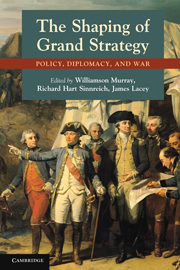Book contents
- Frontmatter
- Contents
- Contributors
- 1 Thoughts on grand strategy
- 2 The grand strategy of the grand siècle: Learning from the wars of Louis XIV
- 3 Strategic culture and the Seven Years' War
- 4 Strategy as character: Bismarck and the Prusso-German question, 1862–1878
- 5 About turn: British strategic transformation from Salisbury to Grey
- 6 British grand strategy, 1933–1942
- 7 Toward a strategy: Creating an American strategy for global war, 1940–1943
- 8 Harry S. Truman and the forming of American grand strategy in the Cold War, 1945–1953
- 9 Patterns of grand strategy
- Index
- References
4 - Strategy as character: Bismarck and the Prusso-German question, 1862–1878
Published online by Cambridge University Press: 05 June 2012
- Frontmatter
- Contents
- Contributors
- 1 Thoughts on grand strategy
- 2 The grand strategy of the grand siècle: Learning from the wars of Louis XIV
- 3 Strategic culture and the Seven Years' War
- 4 Strategy as character: Bismarck and the Prusso-German question, 1862–1878
- 5 About turn: British strategic transformation from Salisbury to Grey
- 6 British grand strategy, 1933–1942
- 7 Toward a strategy: Creating an American strategy for global war, 1940–1943
- 8 Harry S. Truman and the forming of American grand strategy in the Cold War, 1945–1953
- 9 Patterns of grand strategy
- Index
- References
Summary
Germany, situated at the heart of Europe, is Europe's heart. Europe cannot “live” without a sound, strong heart. I have devoted much attention to Bismarck in recent years, and his stature as a diplomat grows continually in my eyes. It is deplorable what a false picture we ourselves have created of him in the world – the politician of force wearing cuirassier's boots – in our childlike pleasure that someone had finally made Germany count for something again. He had a unique skill at creating trust in the world, just the opposite of today. In truth, his great gifts were diplomacy of the highest order, and moderation.
Otto von Bismarck – “the greatest master of diplomacy in the modern era” – is nearly too massive a subject for the modern historian. No historical figure bears more responsibility for the state of great power politics in the long period between 1815 and 1945, and few, if any, in history have managed the strategic policy of their states with such virtuosity. His decisions and policies established the groundwork for the most important geopolitical events of the twentieth century, and his principal creation, a German nation-state at the heart of Europe, endures in truncated form after a half-century of painful adaptation to the world without his guidance.
- Type
- Chapter
- Information
- The Shaping of Grand StrategyPolicy, Diplomacy, and War, pp. 79 - 110Publisher: Cambridge University PressPrint publication year: 2011



